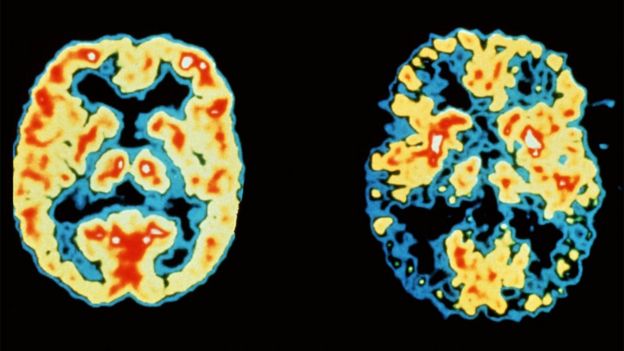UK scientists say they have uncovered tentative evidence that repeated blows to the head during a footballer's professional career may be linked to long-term brain damage.
The research, the first of its kind, follows anecdotal reports that players heading heavy balls may be more prone to developing dementia later in life.
The Football Association says it will look at this area more closely.
But experts said recreational players were unlikely to incur problems.
The small study is published in the journal Acta Neuropathologica.
'Complex combination'
Researchers from University College London and Cardiff University examined the brains of five people who had been professional footballers and one who had been a committed amateur throughout his life.
They had played football for an average of 26 years and all six went on to develop dementia in their 60s.
While performing post mortem examinations, scientists found signs of brain injury - called chronic traumatic encephalopathy (CTE) in four cases.
CTE has been linked to memory loss, depression and dementia and has been seen in other contact sports.
Prof Huw Morris, of University College London, told the BBC: "When we examined their brains at autopsy we saw the sorts of changes that are seen in ex-boxers, the changes that are often associated with repeated brain injury which are known as CTE.
"So really for the first time in a series of players we have shown that there is evidence that head injury has occurred earlier in their life which presumably has some impact on them developing dementia."
The report's authors make it clear they were not analysing the risks of heading by children.
The inquest of ex-England player Jeff Astle, who died in 2002, found that repeatedly heading heavy leather footballs had contributed to trauma to his brain.
His family have been campaigning for further research.
Mr Astle's widow, Laraine, from Netherseal in Derbyshire, said: "We've been saying this for 15 years [since Jeff died]. His inquest said he died of industrial disease.
"It is disgraceful nothing concrete has been done since by the FA or the PFA.
"It's all about informed choice. On the back of a cigarette packet, smokers can read about risks to their health.
"Football has been trying to bury its head in the sand and not admit that the game can be a killer."
But the science is far from clear-cut.Each brain also showed signs of Alzheimer's disease and some had blood vessel changes that can also lead to dementia.
Researchers speculate that it was a combination of factors that contributed to dementia in these players.
But they acknowledge their research cannot definitively prove a link between football and dementia and are calling for larger studies to look at footballers' long-term brain health.

Dr David Reynolds, at the charity Alzheimer's Research UK, said: "The causes of dementia are complex and it is likely that the condition is caused by a combination of age, lifestyle and genetic factors.
"Further research is needed to shed light on how lifestyle factors such as playing sport may alter dementia risk, and how this sits in the context of the well-established benefits of being physically active."
He added that for people who are recreational footballers, football injuries are unlikely to cause long-term problems and he pointed to expert advice that the benefit of exercise is likely to outweigh the risks.
A number of previous cases involving boxers and American footballers have suggested that repetitive blows can cause long-lasting and progressive brain damage.
But until now there have only been a few case reports of individual footballers with CTE in the UK and the extent of the issue is still unknown.
The Football Association welcomed the study and said research was particularly needed to find out whether degenerative brain disease is more common in ex-footballers.
Dr Charlotte Cowie, of the FA, added: "The FA is determined to support this research and is also committed to ensuring that any research process is independent, robust and thorough, so that when the results emerge, everyone in the game can be confident in its findings."
No comments:
Post a Comment